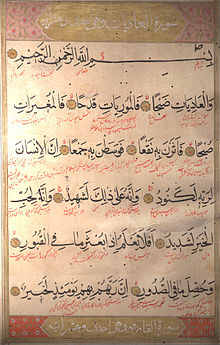Al-Adiyat or The War Horses which run swiftly[1] (Arabic: العاديات, al-ʿādiyāt, also known as "The Courser, The Chargers") is the 100th chapter (sūrah) of the Qur'an, with 11 āyāt or verses. Regarding the timing and contextual background of the revelation (asbāb al-nuzūl), it is an earlier "Meccan surah", which means it is believed to have been revealed in Mecca, rather than later in Medina.
| سورة العاديات Al-ʿĀdiyāt The War Horses | |
|---|---|
| Classification | Meccan |
| Other names | The Chargers, The Assaulters |
| Position | Juzʼ 30 |
| No. of verses | 11 |
| No. of words | 40 |
| No. of letters | 168 |

Summary
edit- 1-6 Oaths that man is ungrateful to his God
- 7-8 Man loves the things of this world
- 9-11 Man’s secret thoughts shall be discovered in the judgment-day [2]
A one liner theme of surah al-adiyat would read that this surah gives an example that horses are more grateful to their owners than men are to their Rabb (Allah).[3]
- First five ayaat of the surah consist of an oath as a metaphor enforcing the lesson.[4] They describe a scene of horses charging, panting, producing sparks by their hooves, raiding at the time of dawn, stirring up the cloud of dust and arriving a gathering.
- The substantive proposition is in verses 6-8 that Man is ungrateful to his Lord and himself is a witness to it and he is immoderate in the love of worldly good.[5]
- The last three ayaat conclude the surah with a rhetorical question that Does the man not know about the time when contents of the graves will be resurrected and that which is in men's breasts shall be brought to light on that Day their Sustainer will show that He has always been fully aware of them.
Text
editText and meaning
editبِسْمِ ٱللَّهِ ٱلرَّحْمَٰنِ ٱلرَّحِيمِ
In the name of Allāh, the Entirely Merciful, the Especially Merciful.
وَٱلْعَٰدِيَٰتِ ضَبْحًا ١
By the racers, panting,
فَٱلْمُورِيَٰتِ قَدْحًا ٢
And the producers of sparks (when) striking
فَٱلْمُغِيرَٰتِ صُبْحًا ٣
And the chargers at dawn,
فَأَثَرْنَ بِهِۦ نَقْعًا ٤
Stirring up thereby (clouds of) dust,
فَوَسَطْنَ بِهِۦ جَمْعًا٥
Arriving thereby in the center collectively,
إِنَّ ٱلْإِنسَٰنَ لِرَبِّهِۦ لَكَنُودٌ ٦
Indeed mankind, to his Lord, is ungrateful.
وَإِنَّهُۥ عَلَىٰ ذَٰلِكَ لَشَهِيدٌ ٧
And indeed, he is to that a witness.
وَإِنَّهُۥ لِحُبِّ ٱلْخَيْرِ لَشَدِيدٌ ٨
And indeed he is, in love of wealth, intense.
أَفَلَا يَعْلَمُ إِذَا بُعْثِرَ مَا فِى ٱلْقُبُورِ ٩
But does he not know that when the contents of the graves are scattered
وَحُصِّلَ مَا فِى ٱلصُّدُورِ ١٠
And that within the breasts is obtained,
إِنَّ رَبَّهُم بِهِمْ يَوْمَئِذٍ لَّخَبِيرٌۢ ١١
Indeed, their Lord with them, that Day, is (fully) Aware.
Translation: Sahih International
Period of revelation
editWhether this Surah Al-Adiyat is a Makki or a Madani is disputed. But the subject matter of the Surah and its style clearly indicate that it is not only Makki, but was revealed in the early stage of Makkan period.[3] Abdullah bin Masud, Jabir, Hasan Basri, Ikrimah, and Ata say that it is Makki. Anas bin Malik, and Qatadah say that it is Madani; and from Ibn Abbas two views have been reported, first that it is a Makki Surah, and second that it is Madani. But the subject matter of the Surah and its style clearly indicate that it is not only Makki but was revealed in the earliest stage of Makkah. So the surah is considered to be Meccan conclusively.[6]
Hadith
editAccording to hadith this surah is recommended in Maghrib prayer.
- Hisham ibn Urwah said that his father used to recite the surahs like the Al-Adiyat is recited. Abu Dawud said: This indicates that those (traditions indicating long surahs) are abrogated, and this is more sound tradition.[7]
Notes
editReferences
edit- ^ George Sale's translation
- ^ Wherry, Elwood Morris (1896). A Complete Index to Sale's Text, Preliminary Discourse, and Notes. London: Kegan Paul, Trench, Trubner, and Co. This article incorporates text from this source, which is in the public domain.
- ^ a b Source: Malik Al-Qur'an Translation Translator: Muhammad Farooq-i-Azam Malik Edition: First, Hardback Published: 1997 Publisher: The Institute of Islamic Knowledge, Houston, Texas, USA
- ^ Source: Yusuf Ali Al-Qur'an Translation Edition: First, Hardback Publisher: Kingdom of Saudi Arabia
- ^ Mohammed, A Comprehensive Commentary on the Quran: Comprising Sale’s Translation and preliminary Discourse, with Additional Notes and Emendations (London: Kegan Paul, Trench, Trubner, and Co., 1896). 4 vols.
- ^ "Chronological Order of Surahs". Archived from the original on 2018-01-13. Retrieved 2016-12-10.
- ^ Sunan Abu Dawud 813 In-book reference : Book 2, Hadith 423 English translation : Book 2, Hadith 812